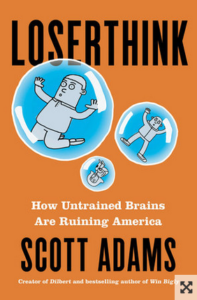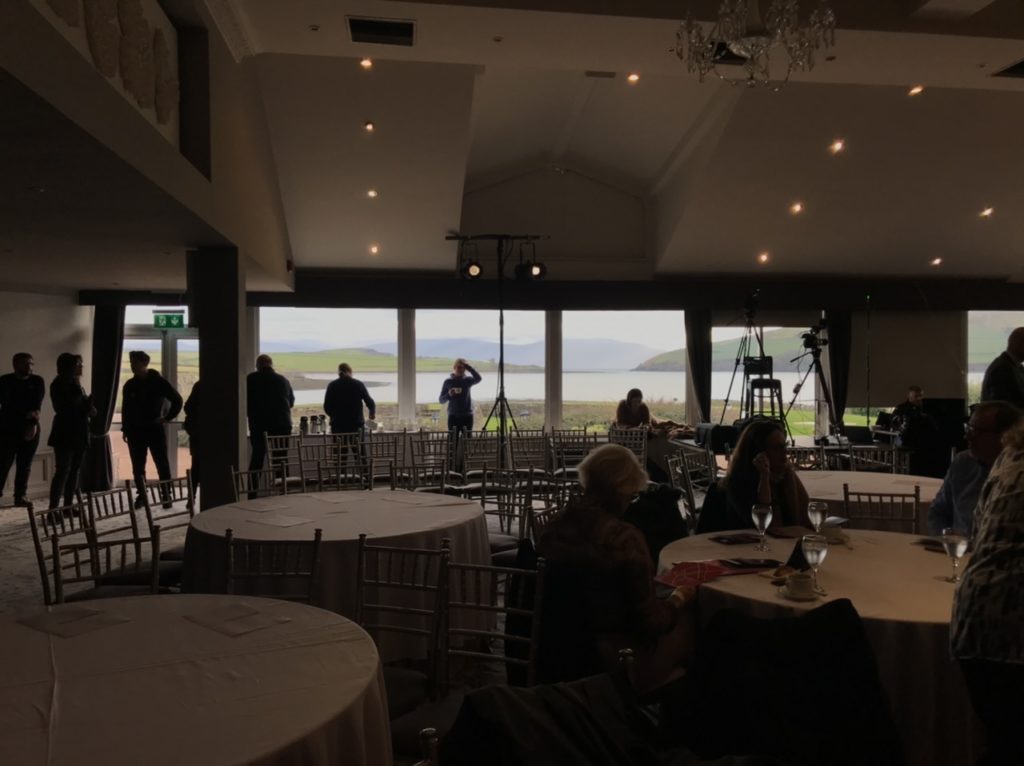- 52 things I learned in 2019 Fascinating: by Tom Whitwell.
- ‘Distracted walking’: Should it be made illegal? Yes! Smombies are a danger to themselves and others.
- The Internet Archive Is Making Wikipedia More Reliable Wow! Thanks to a new initiative by the Internet Archive, you can click the name of a cited book and see a two-page preview of the work, so long as the citation specifies a page number. You can also borrow a digital copy of the book, so long as no else has checked it out, for two weeks—much the same way you’d borrow a book from your local library. Wikipedia was one of the great ideas of the 20th century. So was the Internet Archive. Now they’re joining forces. Which is why I donate regularly to support Wikipedia. You?
Quote of the day
“Victories no longer assume the form that they are expected to assume or that they had assumed in the past. If victory has historically been associated with the defeat of the adversary in a climactic pitched battle, this vision is now a relic from a bygone era. This is not how wars end in the 21st century.”
Linkblog
- All new cell phone users in China must now have their face scanned How long before the UK governments says: “that’s a cool idea”?
- Dilbert’s creator has two rules for a more civilised Internet Scott Adams on learning from his experience.
- Why clean energy isn’t enough to tackle climate change Sure, we need to switch to renewables and electric cars etc. But first we have to reduce our use of fossil fuels. And that’s the really hard bit.
- How Memes Got Weaponized: A Short History Memes might start as a joke, but some people are starting to see them as the serious threat they can be. Sobering tale.
Loserthink
Scott Adams has a new book out. Note the subtitle. Blurb reads:
Even the smartest and most educated among us can slip into ‘loserthink,’ since we haven’t been exposed to the best thinking practices in every discipline. Psychologists, engineers, scientists, entrepreneurs, historians, and artists, for example, all see the world through different filters. If we don’t understand the basics of those filters, we’re likely to fall into loserthink. Some signs you’ve succumbed to loserthink include: inability to get your ego out of your decisions, thinking with words instead of reasons, failing to imagine alternative explanations, trusting your preferred news sources, and making too much of coincidences. And with the never-ending stream of urgent notifications on your phone and anger on your social media feeds, it’s easy to feel miserable, defensive, anxious, poor, and sick. But Adams offers a cure for loserthink by teaching you the most productive thinking practices from a variety of disciplines. In this book, you will learn how to… Recognise the walls of your own mental prison and break out. Understand the world in a way you have never seen it before. Be among the most perceptive and respected thinkers in every conversation. Your bubble of reality doesn’t have to be a prison. This book will show you how to break free.
Linkblog
- The TLS’s Books of the Year Predictably cosmopolitan, often abstruse and quirky. Lots of serious books I should read but probably won’t. Sigh.
- Go Master Lee Sedol says he quits because he’s unable to defeat AI Go machines Sensible chap.
- What is a “narrative violation”? No, I didn’t know eIther. Turns out, it’s just a way to challenge conventional wisdom. But apparently it is the obsession du jour in Silicon Valley at the moment. It’s the kind of thing that gives superficiality a bad name.
- Why you shouldn’t spend too much time thinking about 5G Horse sense from Benedict Evans.
Remembering Clive James
Clive at his deadliest — in the Observer, March 7, 1976
From my tribute to him in today’s paper…
I was privileged to be his successor-but-one. (When he stood down from the paper in 1982, Julian Barnes took over, and I then succeeded Julian in 1987.) I knew when I accepted the job that it would be a tough assignment. Indeed, I had learned that lesson 10 years earlier, because occasionally – when Clive’s TV work took him abroad – I used to be called in by Terry Kilmartin, the Observer’s then literary editor and éminence grise.
On one such occasion, after labouring mightily on the column, I caught the London train on the Sunday morning. Two very grand middle-aged ladies got in and sat opposite me. One of them had a copy of the Observer, and I watched, entranced, as she immediately went to the back page and started to read. I saw her chuckle as the jokes detonated, and I felt a glow of quiet satisfaction: I had finally cracked it. And then, when she had finished reading, she handed the paper to her companion.
“Dorothy”, she said, “you really must read this. Clive James is very funny this morning!”
I may have stepped into his shoes. But they were too big for me. Which is why I miss him.
Podcasting: will it succumb to the Wu cycle?
This morning’s Observer column:
I’ve just been listening to what I think of as the first real podcast. The speaker is Dave Winer, the software genius whom I wrote about in October. He pioneered blogging and played a key role in the evolution of the RSS site-syndication technology that enabled users and applications to access updates to websites in a standardised, computer-readable format.
And the date of this podcast? 11 June, 2004 – 15 years ago; which rather puts into context the contemporary excitement about this supposedly new medium that is now – if you believe the hype – taking the world by storm. With digital technology it always pays to remember that it’s older than you think.
When he started doing it, Winer called it “audioblogging” and if you listen to his early experiments you can see why. They’re relaxed, friendly, digressive, unpretentious and insightful – in other words an accurate reflection of the man himself and of his blog. He thought of them as “morning coffee notes” – audio meditations about what was on his mind first thing in the morning…
Linkblog
- Guardian’s obituary of Clive James
- Serious noticing Tim Adams’s review of James Woods’s collection of essays Lovely review. I particularly liked this bit: “In the opening essay, Wood contrasts the two famous recordings of the Goldberg Variations made by Glenn Gould, one aged 22, the other three decades later; the first is “cocky, exuberant, optimistic”, the second “reflective, seasoned, wintry”. Wood’s mature ear prefers the latter, but part of him always “wants to be the first!” He doesn’t make the connection with his own work, but reading these essays, written over more than two decades, the comparison seems apt in some ways.
- Climate tipping points — too risky to bet against. The growing threat of abrupt and irreversible climate changes must compel political and economic action on emissions. Yeah, but will it? You know the answer.
Quote of the Day
“Foundations are an unaccountable, nontransparent, perpetual, and lavishly tax-advantaged exercise of power.”
- Robert Reich, former US Secretary of Labour and author of Just Giving: Why Philanthropy Is Failing Democracy and How It Can Do Better
Impunity vs. democracy
I’m at Ireland’s Edge, consistently the most interesting event I go to every year. It’s held in Dingle, which is on the westernmost edge of Europe and a place I’ve loved ever since I was a student. And what conference Centre anywhere has a backdrop like the one shown in the pic?
Yesterday, one of the sessions was on “A New Era of Investigative Journalism: Political Polarisation and Surveillance Capitalism”. It was moderated by Muireann Kelliher, co-inventor of Ireland’s Edge, and had a terrific panel: my Observer colleague Carole Cadwalladr, Peter Geoghegan of openDemocracy and Donie O’Sullivan of CNN. There was a spirited discussion of the way in which journalistic exposés of the blatant flouting of electoral and other laws in the Brexit referendum and the 2016 US presidential election by political parties, foreign and domestic actors and social media companies have not resulted in any meaningful penalties for the wrongdoers. The audience came away having been stirred by the manifest injustices and institutional dysfunctionality described by the journalists, but also (I think) deeply pessimistic that anything will be done about the problematique (to use the French term for a real mess) portrayed in the discussion.
On reflection, it occurs to me that the fundamental problem underpinning all this is impunity — i.e. the discovery that there are agents in liberal democracies which are able to behave badly without having to worry about the consequences. We saw this with the banks in the 2008 crisis, and we’re seeing it now with political activists, foreign actors and tech companies. And the reason this is so poisonous is that impunity goes to the heart of the matter. Democracy depends on the rule of law (not, as the Chinese regime maintains, rule by law). Its fundamental requirement is that no one or no institution is above the law, and what we’re discovering now is that that no longer holds in many democracies — and most shockingly in two supposedly mature democracies: the UK and the US.
How did we get here? One of the reasons is that since the 1970s governments and ruling elites have drunk the neoliberal Kool Aid which privileges markets — and the corporations that dominate them. One of the reasons the 2008 banking crisis happened is that in preceding decades the regulations under which banks operated were loosened (using the hoary old “red tape” trope) to create a legal environment in which they were able to screw the world economy with impunity. And our failure to anticipate the growth of tech power led to a failure to create a regulatory environment which would punish monopolistic and irresponsible business models. And now we’re living with the consequences.



